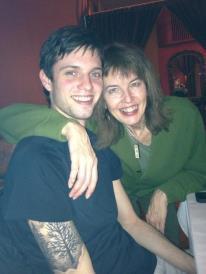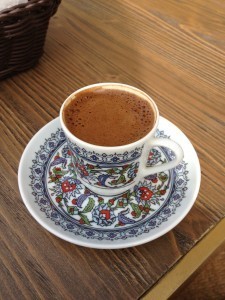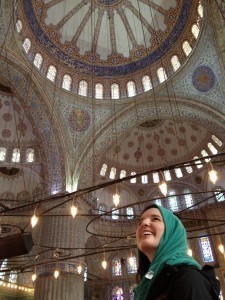Alison McGhee's Blog, page 27
May 25, 2013
Poem of the Week, by Thomas Lux
From The Neighborhood of Make-Believe
- Thomas Lux
It is elsewhere, elsewhere, the neighborhood you seek.
The neighborhood you long for,
where the gentle trolley –ding, ding– passes
through, where the adults are kind
and, better, sane,
that neighborhood is gone, no, never
existed, though it should have
and had a chance once
in the hearts of women, men (farmers dreamed
this place, and teachers, book writers, oh thousands
of workers, mothers prayed for it, hunchbacks,
nurses, blind men, maybe most of all soldiers,
even a few generals, millions
through the millennia…), some of whom,
despite anvils on their chests,
despite taking blow after blow across shoulders and necks,
despite derision and scorn,
some of whom still, still
stand up everyday against ditches swollen with blood,
against ignorance, still dreaming,
full-fledged adults, still fighting,
trying to build a door to that place,
trying to pry open the ugly,
bullet-pocked, and swollen gate
to the other side,
the neighborhood of make-believe.
–
For more information on Thomas Lux, please click here: http://www.poetryfoundation.org/bio/thomas-lux
–
Facebook: http://www.facebook.com/home.php?#!/pages/Alison-McGhee/119862491361265?ref=ts
May 18, 2013
Poem of the Week, by Naomi Shihab Nye
Shoulders
- Naomi Shihab Nye
A man crosses the street in rain,
stepping gently, looking two times north and south,
because his son is asleep on his shoulder.
No car must splash him.
No car drive too near to his shadow.
This man carries the world’s most sensitive cargo
but he’s not marked.
Nowhere does his jacket say FRAGILE,
HANDLE WITH CARE.
His ear fills up with breathing.
He hears the hum of a boy’s dream
deep inside him.
We’re not going to be able
to live in this world
if we’re not willing to do what he’s doing
with one another.
The road will only be wide.
The rain will never stop falling.
–
For more information on Naomi Shihab Nye, please click here.
–
Facebook: http://www.facebook.com/home.php?#!/pages/Alison-McGhee/119862491361265?ref=ts
May 12, 2013
Poem of the Week, by Philip Booth
First Lesson
- Philip Booth
Lie back daughter, let your head
be tipped back in the cup of my hand.
Gently, and I will hold you. Spread
your arms wide, lie out on the stream
and look high at the gulls. A dead-
man’s float is face down. You will dive
and swim soon enough where this tidewater
ebbs to the sea. Daughter, believe
me, when you tire on the long thrash
to your island, lie up, and survive.
As you float now, where I held you
and let go, remember when fear
cramps your heart what I told you:
lie gently and wide to the light-year
stars, lie back, and the sea will hold you.
For more information on Philip Booth, please click here.
Facebook: http://www.facebook.com/home.php?#!/pages/Alison-McGhee/119862491361265?ref=ts
Twitter: @alisonmcghee
May 4, 2013
Poem of the Week, by Margaret Mackinnon
The Invented Child
- Margaret Mackinnon
(I spring from the pages into your arms.)
Someone who once knew him said
Walt Whitman sang before breakfast
behind his bedroom door—
broken arias, bits of patriotic tunes,
the way my child sings this morning
in early spring, the way
the raucous mockingbirds fill the warming air
with their own borrowed songs.
The world is once again its hopeful green.
Bold forsythia bursts its spindly stalks.
The young trees again flicker on the slopes,
and when he ended his days on dusty
Mickle Street, Whitman must have remembered
mornings like this—
Nights, no longer really sleeping, confined
to the paralytic chair, say he remembered
that earlier, softer air, the light on the water
in that clearing he had called Timber Creek,
the idea of it—
Say he thought again of those days
when he was still fat & red & tanned,
when he’d strip off his clothes
and roll his great flesh in the pond’s black marl.
In the close, bug-ridden room in Camden,
he spoke, sometimes, of a grandson,
fine boy, a Southern child who sometimes wrote,
once stopped by—
No one ever saw him.
An old poet. His invented child.
Though why shouldn’t a man
who’d always lived in words create something
to endure his sore, soiled world?
There is at Timber Creek, Whitman wrote about the trees
their rough bark, the massive limbs and trunks
as if they were the bodies of those he’d loved.
Some people believe the souls of unborn children
rest in trees. Say he saw them, then,
caught their soft breath
sweet as the spice bush, lush as the early crocus.
In the long, hard work of his imagination,
say he watched their disembodied hearts
sway among the new leaves,
watched the eager light shine on another fine morning
until the sky lifted above him
like exultant, fresh desire—
and the children descended,
and then the crowns of the trees were all on fire.
- For more information on Margaret Mackinnon, please click here: http://imagejournal.org/page/artist-o...
Facebook: https://www.facebook.com/pages/Alison...
April 27, 2013
Poem of the Week, by Adam Zagajewski
Try to Praise the Mutilated World
- Adam Zagajewski
Try to praise the mutilated world.
Remember June’s long days,
and wild strawberries, drops of wine, the dew.
The nettles that methodically overgrow
the abandoned homesteads of exiles.
You must praise the mutilated world.
You watched the stylish yachts and ships;
one of them had a long trip ahead of it,
while salty oblivion awaited others.
You’ve seen the refugees heading nowhere,
you’ve heard the executioners sing joyfully.
You should praise the mutilated world.
Remember the moments when we were together
in a white room and the curtain fluttered.
Return in thought to the concert where music flared.
You gathered acorns in the park in autumn
and leaves eddied over the earth’s scars.
Praise the mutilated world
and the gray feather a thrush lost,
and the gentle light that strays and vanishes
and returns.
For more information on Adam Zagajewski, please click here.
April 20, 2013
Poem of the Week, by Czeslaw Milosz
Hope
- Czeslaw Milosz
Hope is with you when you believe
the earth is not a dream but living flesh,
that sight, touch, and hearing do not lie,
that all things you have ever seen here
are like a garden looked at from a gate.
You cannot enter. But you’re sure it’s there.
Could we but look more clearly and wisely
we might discover somewhere in the garden
a strange new flower and an unnamed star.
Some people say we should not trust our eyes,
that there is nothing, just a seeming.
These are the ones who have no hope.
They think that the moment we turn away,
the world, behind our backs, ceases to exist,
as if snatched up by the hands of thieves.
For more information on Mr. Milosz, please click here.
Facebook: https://www.facebook.com/pages/Alison...
Twitter: @alisonmcghee
April 13, 2013
Poem of the Week, by Coleman Barks
Word Choice
- Coleman Barks
Slubby comes from the Dutch, who know a lot about mud,
in their lowdown Brueghel-dance ways.
Slubby names the miry-slick stickiness
where ducks might love sliding into a lake.
I love another wet-earth word, sillion. Firmer,
the curve of a furrow the plow has just turned over,
used only one place in poetry as far as I know.
Sheer plod makes plough down sillion shine.
I shall now display more mud-related words.
Mumbledypeg, the knife game where the one who loses
has to dig the peg out with his teeth,
the peg that has been pounded deep with the heel of the knife,
and Barry Heywood goes after it with such earth-eating ferocity
he comes up spewing soil from his dirtface that has now a center
with between his teeth like an ivory narwhal horn, the peg.
A path through tall grass after heavy rain
feels clodgy underfoot. Earth sticking to a spade
when you are digging, that piece of ground
is cledgy to work with.
Gawm is especially sticky and foul-smelling mud.
A wagon axle could get gormed up with gawm.
Gubber is black-rot anaerobic material,
no breath letout-tatall.
A clod is fairly coherent earthen wonderment.
A paunch, among other things, is what a cow does
with its hoof to a clod. They paunch about
crumbling the plowed field to mudproper.
Muddling through, there is a thick pudding
you call stodge. Stug is more watery.
Silt you already know, very fine.
People used to patch their houses with stug.
I have a place I stug.
What do you call the little ridges of parallel tunnels
that mud daubers make? Toy Quonset dobberdoms.
I am become a scholar of mud.
Pug is a kind of loam, the tacky yellow sort.
A slough is a mudhole,
though it may have deep places and be connected to a river.
Smeery means a wet mud-surface, not clodgy, or slobbed up.
Slob and slub, more thick-mud words.
Slub will take your shoe off and keep it.
With these mud-words you can trade vowels around,
because that is the world they are in.
He come home all of a slub.
He slubbed home through the stodge.
Sleech is bottom sediment spread for manure.
Slurry, mud diluted to cream.
Spannel means to make the indoors like the out, as a dog might,
splushing in the slough, then spanneling through the kitchen.
And since embodiment is the river’s use of mud,
to scud the springflood with fleering mist is joy.
–
For more information on Coleman Barks, please click here: http://www.colemanbarks.com/
–
Facebook: http://www.facebook.com/home.php?#!/pages/Alison-McGhee/119862491361265?ref=ts
Manuscript Critique Service:
http://alisonmcghee.com/manuscript.html
April 6, 2013
Poem of the Week, by Naomi Shihab Nye
Wedding Cake
- Naomi Shihab Nye
Once on a plane
a woman asked me to hold her baby
and disappeared.
I figured it was safe,
our being on a plane and all.
How far could she go?
She returned one hour later,
having changed her clothes
and washed her hair.
I didn’t recognize her.
By this time the baby
and I had examined
each other’s necks.
We had cried a little.
I had a silver bracelet
and a watch.
Gold studs glittered
in the baby’s ears.
She wore a tiny white dress
leafed with layers
like a wedding cake.
I did not want
to give her back.
The baby’s curls coiled tightly
against her scalp,
another alphabet.
I read new new new.
My mother gets tired.
I’ll chew your hand.
The baby left my skirt crumpled,
my lap aching.
Now I’m her secret guardian,
the little nub of dream
that rises slightly
but won’t come clear.
As she grows,
as she feels ill at ease,
I’ll bob my knee.
What will she forget?
Whom will she marry?
He’d better check with me.
I’ll say once she flew
dressed like a cake
between two doilies of cloud.
She could slip the card into a pocket,
pull it out.
Already she knew the small finger
was funnier than the whole arm.
For more information on Naomi Shihab Nye, please click here: http://www.poets.org/poet.php/prmPID/174
–
Facebook: http://www.facebook.com/home.php?#!/pages/Alison-McGhee/119862491361265?ref=ts
April 4, 2013
“I am a sky where spirits live”
 You and your older daughter are nearing the end of a sojourn in an unfamiliar land, a land that is neither Europe nor Asia but the meeting point of both; that has long been its reputation, and it has proven to be true. Never have you been in a place that feels like such a crossroads – a land where an Eastern emperor succeeded a Western one, where one religion superimposed itself upon another, where the traditions of thousands of years exist side by side with cell phones and free wi-fi.
You and your older daughter are nearing the end of a sojourn in an unfamiliar land, a land that is neither Europe nor Asia but the meeting point of both; that has long been its reputation, and it has proven to be true. Never have you been in a place that feels like such a crossroads – a land where an Eastern emperor succeeded a Western one, where one religion superimposed itself upon another, where the traditions of thousands of years exist side by side with cell phones and free wi-fi.
The two of you began your trip by getting on separate airplanes and meeting in a huge airport outside a huge city in the middle of your own huge country. It was night and you took the train into that city, trundling your carry-ons behind you, and met her older brother at a Moroccan restaurant.
The three of you  drank hot, sweet mint tea, ordered an appetizer decreed by the brother to be a “chicken doughnut,” sampled each other’s tagines, and ended the meal with a coconut-mango dacquoise, a word none of you knew the meaning of but which you all enjoyed pronouncing.
drank hot, sweet mint tea, ordered an appetizer decreed by the brother to be a “chicken doughnut,” sampled each other’s tagines, and ended the meal with a coconut-mango dacquoise, a word none of you knew the meaning of but which you all enjoyed pronouncing.
The three of you sat around a table in a room draped ceiling-to-floor with billowy swoops of bright cotton. An hour in from one end of the blue line for you and your girl, an hour out from the other end of the blue line for your boy. A meeting in the middle.
Then you hugged him goodbye and watched as he walked off into the dark night to board the train back to the house where he lives now. You fought back the sensation you always feel when you watch him walk away, which is bewilderment and disorientation: How did this happen?
How did he grow up and move away from the house where he used to live, with you, the house where you used to butter his toast and set it before him in the quiet morning?
Don’t start, you told yourself, because there was no way to understand how this had happened. It was too big and too dizzying, and it had to do with the passage of time, which is something that despite your hyperawareness of it you have never been able to understand.
You and your girl trundled your carry-ons back to an airport motel and next day boarded a plane which took you to that unfamiliar, enormous city sprawled on either side of the Bosphorus Strait in a land that borders Syria and Iraq and Armenia and Georgia. 
This land had always shimmered in your mind as a mythical place –site of two magnificent empires, fulcrum point of warring factions. You and your girl take photos of each other standing by the Bosphorus, in the Grand Bazaar, in the Spice Market, on a bluff looking north toward the mouth of the Black Sea.
The two of you wander the neighborhood streets and try to figure out the ingredients for the sweets displayed in windows. You try all manner of mezes, little plates of food that you share: fried mussels, eggplant salad, sauteed greens, shish kebap, pumpkin stewed long and slow in honey and sprinkled with figs and pistachios. You drink tea that comes in the same potbellied glasses no matter where you order it, a small spoon standing in each glass to absorb the heat. 
You try Turkish coffee, swirling the muddy grounds and feeling the caffeine charge instantly through your bloodstream.
Before you enter a mosque so huge and so beautiful that you can hardly comprehend that it was built in only a few years, the two of you cover your heads with scarves and remove your boots and then crane your necks skyward.
In a roped-off section, men on their knees pray. In a basin meant for washing before prayer, a tiny boy pretends to take a bath while his parents laugh and take photos of him. You and your girl pick up pamphlets titled “Understanding Islam” and take them outside, where you sit on a bench in the sun and read them.
You both admit to each other that this little booklet is so well-written, clear, and easy to understand that you both feel far more informed about Islam than you ever have before.
Wherever you go you practice the five words you memorized, which are the same words you try to memorize in all languages: Hello. Please. No. Yes. Thank you.
At an outdoor cafe you see a sign for Turkish Hot Milky Drink with Orchid Roots and order a cup out of curiosity. You expect it to taste nasty, but when the waiter brings it over –two cups instead of the one you ordered– you can’t believe how delicious it was.
Sahlep is the name of this drink, sprinkled with cinnamon and served only in winter, and you buy some sahlep powder in the Spice Market to bring back home with you.
One day, you get up early and take a ferry up the river to a little fishing village on the Asian side of the Bosphorus. You climb a steep hill to the ruins of an old castle, where you stand on a bluff and gaze out at the mouth of the Black Sea. The knowledge of the ancient history that has taken place there, that is taking place now, makes you shiver the same way that beholding the underground cisterns, supported with Roman columns, makes you shiver.
You think of Syria, the country on the southern border of the land where you are standing, and what is happening there right now. That familiar feeling of disorientation and bewilderment –how do these things happen? How did we get here from there?– is dizzying.
A few days into the sojourn, you wake at dawn in the dark and quiet of your hotel room. Your daughter sleeps silently in the bed next to yours and you listen as the muezzin wails the morning call to prayers from a nearby minaret. You get up and push back the curtain, see the world coming slowly into light. The Bosphorus tumbles by below the window, gray and opaque, and pigeons gather on the square. 
This call to prayers comes five times a day, drifting over the entire city. Over the entire land. In a country where ninety-nine people out of one hundred are Muslim, the call to prayers is a constant reminder to pause. To take note. To breathe.
You witness restaurant owners turn off their music and stand silent in the doorway, listening. You witness others raise their voices to carry on their laughter and conversation over the song. Observant or not, the ritual is part of everyone’s daily life. You think, I will hear this call for the rest of my life.
Women in full burka walk on the arms of their husbands next to women in tights and spike heels. In the Hagia Sophia, Arabic inscriptions from the prophets hang next to ancient mosaics depicting Jesus and Mary and Joseph. In this city, east meets west, Christianity meets Islam, and if you don’t have enough Turkish lira, euros will work.
You and your daughter are here, just the two of you, in this mythical land. One foot east, one foot west. One of you just turned twenty, the other is in the middle of her life. You forced yourself not to have expectations of this trip, because you have learned that it’s always better just to live the days as they happen.
She is your middle child. The two of you have never had a long stretch of time together, years together alone, the way her older brother and younger sister did. This knowledge has always, for some reason, cracked your heart.
some reason, cracked your heart.
There comes an evening when the two of you are returning to your hotel after a long day of wandering. The bus is crowded and you hang onto the overhead strap, tired and thirsty. All around you the other riders chat quietly in Turkish, stare into space, smile down at their cell phones.
You turn, seeking out your girl, and there she is, looking out the window toward the Bosphorus, her arm wrapped around a pole. Her eyes have that same faraway, peaceful look as that day when she was a kindergartner, her forehead pressed against the window of the schoolbus, and her teacher turned to you and said, “Look, Alison. Just look at that beautiful child.”
Seeing her now, like that long-ago day when she didn’t know you were watching her, your heart clenches. This is one of those moments that come sometimes in life, when everything is in place, when it feels as if everything has led you to this moment. The crowded bus, the water splashing onto the cobblestones below the bluff, your daughter dreaming of something you’ll never know. Your life has arrowed itself toward this single perfect moment.
The world outside will come roaring in again. You will return to your life and its many obligations and responsibilities, to that familiar world where east clashes with west and people keep dying and dying at each other’s hands.
But not now. Not right now.
I am a sky where spirits live.
Stare into this deepening blue,
while the breeze says a secret.
Like this.
When someone asks what there is to do,
light the candle in his hand.
Like this.
April 2, 2013
(NOTE: CLASS IS FILLED) Another One-Day Creative Writing Kickstart class!
CLASS IS FILLED, but I will continue to offer one-day workshops regularly. Thanks.
Greetings, writers and writerly types,
I’m offering a one-day creative writing workshop –Creative Writing Kickstart– on Sunday, April 14. The class will touch on various aspects of creative writing craft, but our main focus, now that the snow is (nearly) gone is to get the creative juices flowing.
In one afternoon, we’ll read and discuss some fabulous published works –poetry, memoir and fiction, with maybe a little children’s lit thrown in there– talk about what makes great writing great, and complete three or four short writing prompts.
The class is fun and low-key and designed for writers of all abilities, experience levels and genres. If you’re a longtime writer in need of a boost or someone who’s always had an interest in writing but never known how to sit down and get started, please join us! And please feel free to send this email to anyone else who might enjoy the class.
Limited to eleven. If you’re interested, please email me at alison_mcghee@hotmail.com to reserve a spot.
Date: Sunday, April 14
Time: 1-5 p.m.
Place: my house in the Uptown neighborhood of south Minneapolis. On-street parking is usually plentiful, and I’m three blocks from several bus stops in all directions.
Cost: $50.
Bring: yourself, a pen and a notebook. Water and some sort of tasty treat will be provided.

–
Facebook: http://www.facebook.com/home.php?#!/pages/Alison-McGhee/119862491361265?ref=ts
Manuscript Critique Service:
http://alisonmcghee.com/manuscript.html





